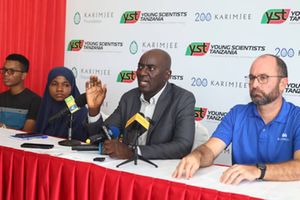Kikwete tips Sadc nations on technology investment

Former President Jakaya Kikwete
Arusha. Former President Jakaya Kikwete has warned that millions of fresh graduates across Africa will be rendered jobless if governments failed to invest more in high tech skills.
The former Tanzanian head of state implored on the South African Development Community (Sadc) member states to see artificial intelligence (AI) both as an opportunity and threat in the fast-evolving labour market.
He was speaking to the media yesterday in a special interview ahead of the 39th Session of Sadc Heads of States and Government Summit, which will be held in Dar es Salaam from August 17-18.
Dr Kikwete challenged the partner states in the 16 nation bloc to invest appropriately in AI so as to guarantee jobs to their highly skilled people. He warned: “Millions of fresh graduates in Africa will be robbed of their dear jobs by emerging technologies such as artificial intelligence.”
Failure to invest in AI will see many employed people and fresh graduates rendered jobless because there will be little demand for manual jobs, he said.
According to him, by 2050 half of the jobs in Africa will be taken over by ‘intelligent machines’ that have become an essential part of the technology industry.
“There will be no labourers, welders, auto mechanics or even drivers. Only those with high levels of skills will be guaranteed of employment,” he pointed out.
His remarks came yesterday as Sadc member states acknowledged that investment in research, development and innovation remains low in the region.
“The majority of member states (are) investing below 1 per cent of Gross Domestic Product for Research and Development to advance competitiveness and industrial development,” the member states noted in declaration issued at the end of 4th Annual Sadc Industrialisation Week that was held at Julius Nyerere International Convention Centre from August 5-9.
Among the key priority areas that the member states agreed to pay attention to and act on was increasing GDP investment in research, and development by both public and private sectors to advance competitiveness and industrial development.
They declared to “investment in skills development in areas of digital skills, data science, artificial intelligence, robotics, 3D printing in order to leverage the opportunities of the fourth industrial revolution for industrial development.
Skills competition and innovation awards programmes to be established at national and regional levels, they noted.
Dr Kikwete said although artificial intelligence was a highly technical and specialised field, it was time for the Sadc member countries to prepare for the challenges it posed.
He, therefore, stressed that it was high time partner states in the bloc made serious investments in education and research so as to impart skills on their people.
This, according to him, will guarantee employment for the young graduates and accelerate the pace of industrialization in the bloc.
“Let us ensure our youths have access to education, but the type of education that will guarantee employment,” he said during the special interview.
He said the much-hyped industrialisation drive for the bloc would not attain the desired results without the skilled human resource.
The former head of state added that, industrialisation in the Sadc region will be spearheaded by the private sector, he argued, lacked the critical labour force for the task.
He noted that despite its fairly developed transport and industrial infrastructure, the Sadc region remained far behind in the ‘ease of doing business’ compared to other parts of the world.
“Sadc still lagged behind. Mauritius is the only country in the region that has scored highly not only for Africa but the rest of the world,” he further told journalists.
The indexis were developed by the World Bank, World Economic Forum (WEF) and the Mo Ibrahim Institute.




